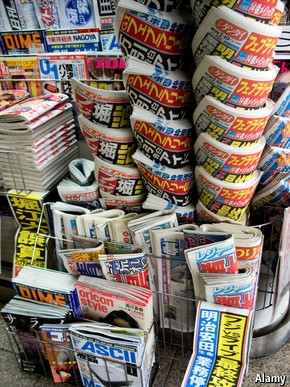Press freedom in Japan
日本新聞自由
Secrecy and lies
保密與謊言
A tough new law on secrecy has suddenly become controversial
一部事關(guān)保密的嚴(yán)苛新法突然間引起了爭(zhēng)議
Oct 19th 2013 | TOKYO |From the print edition
Full of leaks
都在泄密

“A PARADISE for spies” is how a former agent of the Soviet KGB described Japan in the 1980s. Little has changed, though now the politicians and bureaucrats more often pass information to journalists than to foreign agents. But this autumn Shinzo Abe, the prime minister, is trying to stop the leaks by passing a forceful new secrecy law, even as he seeks to pass economic reforms as part of his programme of measures known as “Abenomics”. He also wants to legislate for a new national security council in order to centralise intelligence information and speed decisions on national security. New rules on secrecy are needed for it to function well, says the government. The media, fearful for press freedom, are crying foul.
“間諜的天堂”,在80年代,潛伏日本蘇聯(lián)克格勃特工如此稱呼這個(gè)國度。到如今,“天堂”依然是“天堂”,只不過相比外國特工,政客與官員現(xiàn)在更多是把消息透露給記者。但這個(gè)秋天,安倍晉三首相決意推動(dòng)一部新的強(qiáng)有力的保密法案,希望以此止住泄密。其認(rèn)真程度,不下于他推動(dòng)“安倍經(jīng)濟(jì)學(xué)”中的經(jīng)濟(jì)改革法案。他還想設(shè)立一個(gè)國家安全委員會(huì),用以集中情報(bào)信息,便于對(duì)國家安全問題做出快速?zèng)Q策。政府稱,國家安全委員會(huì)需要新保密法案的支持。為新聞自由擔(dān)憂的媒體界高呼此舉違規(guī)。
Japan is much less punitive than other countries towards leakers. Civil servants who breach rules on confidentiality are currently liable to just one year in prison. Only officials of Japan’s Self Defence Forces face the possibility of stricter punishment: five years for leaking defence secrets, or ten if they are gleaned from Japan’s security pact with America.
相比其他國家,日本對(duì)泄密者的懲罰較輕。違規(guī)泄密的公務(wù)員只會(huì)被判一年徒刑。只有自衛(wèi)隊(duì)的官員會(huì)遭受更嚴(yán)厲的懲罰:泄露軍事機(jī)密判5年,收集日美軍事關(guān)系情報(bào)的判10年。
The gap widened after the events of September 11th 2001, when security elsewhere became tighter. This year America used its Espionage Act of 1917 to hand down a 35-year prison sentence to Bradley Manning, a former soldier, for passing information to the WikiLeaks website. Previous Japanese governments have tried to clamp down, but memories of the feared wartime secrecy regime have caused moves to tighten the law to be blocked.
2001年9·11之后,全球各地的安全局勢(shì)變得緊張,而對(duì)軍人泄密的懲罰也隨之加重。今年,美國依照1917年制定的《反間諜法》,判處了布拉德利·曼寧35五年監(jiān)禁。這位曾經(jīng)的軍人因向維基解密網(wǎng)站提供情報(bào)而獲罪。日本前幾任的政府都曾努力推動(dòng)類似法案,但由于對(duì)戰(zhàn)時(shí)保密制度的恐懼記憶猶新,法案受到了阻撓。
Japan’s allies, especially America, complain that information entrusted to it is too often leaked, says Nobutaka Machimura, a former foreign minister who heads the ruling Liberal Democratic Party’s task-force on the law. If passed, the bill would apply to all civil servants and to high-ranking politicians. “Special secrets” would be designated in three new fields of diplomacy, counter-espionage and counter-terrorism (in addition to defence). The penalty for leaks—also applied to those who encourage breaches, such as journalists—would be up to ten years in prison. Further details are scant, but the bill reportedly lacks important provisions, including independent review of what can be called secret, and a clear limit on the period of confidentiality.
前任外務(wù)大臣,負(fù)責(zé)自民黨這次立法行動(dòng)的町村信孝說,日本的盟國,尤其是美國,都抱怨說委托給日本的情報(bào)泄密過于頻繁。如果法案得以通過,那將適用于所有公務(wù)員,包括高級(jí)別的政治家。“特秘”情報(bào)(除軍事以外還)包括外交、反間諜與反恐三方面。對(duì)泄密者的懲罰——包括鼓動(dòng)泄密的,譬如記者——將是十年徒刑。具體細(xì)節(jié)仍然未知,但據(jù)說法案缺少一些重要條款,包括對(duì)機(jī)密定義的獨(dú)立審查,以及保密期長(zhǎng)的限制。
That means the government could keep far more information under the veil than is necessary, says Kiyoshi Gojima, deputy managing director of Sankei Shimbun, a newspaper. The public would have less access to information than before, to some degree reversing a campaign in recent years for greater government transparency.
《產(chǎn)經(jīng)新聞》副社長(zhǎng)Kiyoshi Gojima稱,這樣的法案意味著政府可能會(huì)秘密掌握太多信息,超出必要數(shù)目。公眾知情權(quán)更少了,這是對(duì)近年來要求更大政府透明度之潮流的一種顛覆。
In the field of diplomacy, for instance, the contents and outcome of summit meetings could be kept firmly secret. Last month, Norika Fujiwara, a television celebrity, warned that information relating to radiation from the meltdown at the Fukushima Dai-ichi nuclear plant in 2011 could be ruled off limits by the new law. An adviser to Mr Abe denied this would happen.
以外交領(lǐng)域?yàn)槔啄X級(jí)會(huì)議的內(nèi)容與結(jié)果都將保密。電視明星藤原紀(jì)香上個(gè)月警告說,與2011年福島核電站第一反應(yīng)堆泄露有關(guān)的信息也將為新法所禁。安倍的一名顧問否認(rèn)了這一點(diǎn)。
Another risk is that public officials will stop talking to journalists entirely, says Mr Gojima. That would be a big shift from the current system of privileged press clubs, in which reporters have special channels to sources in the government and bureaucracy who pass on inside information. The current system needs reform, says Koichi Nakano of Sophia University, but there is no need to jump to the other extreme.
另一風(fēng)險(xiǎn)是,公職官員會(huì)完全停止與記者的往來,Gojima如是說。這將極大地改變現(xiàn)有的特權(quán)新聞俱樂部體系,記者將再難通過特殊渠道從政府機(jī)構(gòu)獲取信息。現(xiàn)有體系是需要改革,但也不需要走到另一個(gè)極端,上智大學(xué)政治學(xué)教授中野晃一如是說。
The final bill is expected to state the public’s right to know, and to include a commitment to press freedom. The LDP’s coalition partner, New Komeito, will insist on such amendments. But public opinion seems to be firmly against the law, so Mr Abe may face resistance, even though his government has a majority in both houses of parliament. One unwelcome outcome would be if the bill diverts government attention from economic reforms.
法案的最終版本將涉及公眾知情權(quán),并包括對(duì)新聞自由的承諾。自民黨的盟友新公明黨將致力于完成這些修正。但公眾堅(jiān)決反對(duì)這項(xiàng)方案。即便安倍在國會(huì)兩院都坐擁多數(shù)席位,他的前方仍有阻礙。如果這項(xiàng)法案分散了在經(jīng)濟(jì)改革上的專注,那結(jié)果就不妙了。











